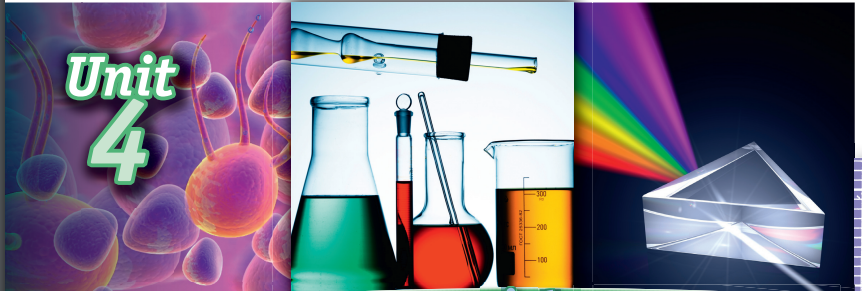Unit 4
Lesson 1
Student’s Book pages 30-31
Science and scientists
Before you begin
Look at the picture

What types of science are shown in each picture?
Answers
Left to right: Biology, Chemistry, Physics
The key words
|
The word |
The meaning |
The part of speech |
|
organism |
a very small living thing |
Noun |
|
botany |
the study of the life of plants |
Noun |
|
zoology |
the study of animal life |
Noun |
|
ecology |
study of the relation of living things with each other and their environment |
Noun |
|
environmental science |
the study of living things and how they grow and live in their environment |
Noun |
|
combine |
to unite two or more different things to form a compound |
verb |
|
branch |
one part of a large subject of study or knowledge |
Noun |
|
interact |
to come together and have an effect on each other |
verb |
|
cell |
the smallest particle in the body that can only be seen through a microscope |
Noun |
| geology | the study of Earth’s stones and rocks | Noun |
While reading
Science matters
Do you like science? Whatever you think of science, there is no doubt that it can be very surprising.
Science tries to answer many of the questions that we like to ask about the world around us. Do you know, for example, that lightning is ten times hotter than the Sun? Or that a hundred million micro-organisms live in your mouth?
The three main areas of science are Biology, Chemistry and Physics. Biology is the study of living things. It includes the fields of botany, zoology, ecology and environmental science. Chemistry is the study of the building blocks of nature and how they combine to form the solids, liquids and gases that make up everything. Physics is the branch of science that deals with matter and energy and how they interact.
Science tries to answer questions such as: Why do we see lightning before we hear thunder? Why do we need to breathe in more air during exercise? What do oil and coal come from?
Physicists have shown us that light travels faster than sound. It is the fastest thing we know. Biologists explain that when we do exercise, the cells in our body need more oxygen. Chemists have found that oil and coal come from plants and animals that lived millions of years ago.
The text talks about:
- The importance of science.
- Ecology, botany and zoology are considered branches of Biology.
- The important discoveries that science has discovered about the world around us.
After reading
-Why does science matter?
Because science tries to answer many of the questions that we like to ask about the world around us.
-Give examples.
Lightning is ten times hotter than the Sun, and a hundred million micro-organisms live in your mouth. Why do we see lightning before we hear thunder? Why do we need to breathe in more air during exercise? What do oil and coal come from?
-What are the three main areas of science?
Biology, Chemistry and Physics.
-Which fields does Biology include?
It includes the fields of botany, zoology, ecology and environmental science.
What is Biology?
Biology is the study of living things.
What is Chemistry?
Chemistry is the study of the building blocks of nature and how they combine to form the solids, liquids and gases that make up everything.
What is Physics?
Physics is the branch of science that deals with matter and energy and how they interact.
-Match:
|
Scientists |
Discoveries |
|
1 Biologists
2 Physicists
3 Chemists
|
a-have found that oil and coal come from plants and animals that lived millions of years ago.
b-explain that when we do exercise, the cells in our body need more oxygen.
c- have shown us that light travels faster than sound. It is the fastest thing we know. |
1 b
2 c
3 a
-